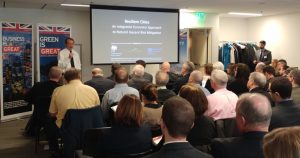by the Sustainable Solutions Lab
 A delegation from the UK joined nearly 100 Boston area experts from academia, insurance, specialized consultancies, city and local government agencies, and other members of the community earlier this month to discuss climate-related challenges that Boston is facing and climate adaptation financing. In partnership with the British Consulates of Boston and Miami and the Boston Green Ribbon Commission (GRC), the Sustainable Solutions Lab at UMass Boston co-convened “Resilient Cities: An Integrated Economic Approach to Natural Hazard Risk Mitigation” at the Boston Society of Architects.
A delegation from the UK joined nearly 100 Boston area experts from academia, insurance, specialized consultancies, city and local government agencies, and other members of the community earlier this month to discuss climate-related challenges that Boston is facing and climate adaptation financing. In partnership with the British Consulates of Boston and Miami and the Boston Green Ribbon Commission (GRC), the Sustainable Solutions Lab at UMass Boston co-convened “Resilient Cities: An Integrated Economic Approach to Natural Hazard Risk Mitigation” at the Boston Society of Architects.
With sea level rise of up to seven feet possible by the end of the century, major storms are likely to cause severe damage to buildings and infrastructure, with neighborhoods such as East Boston and Seaport particularly exposed. UMass Boston has been closely involved with the City’s Climate Ready Boston program, in collaboration with the GRC and the Barr Foundation, working to identify these climate risks, assess the vulnerabilities, and propose solutions.
Resilience investments will not be cheap, with sums challenging the resources of major cities. In addition, these investments are difficult to finance because the payoff, in terms of damage avoided, is very long-term and highly uncertain. Investing in resiliency, therefore, calls for creative approaches to financing that can leverage private capital, identify co-benefits, and provide incentives, such as lower insurance rates. Guests from the UK described sophisticated financial instruments that combine bond financing with insurance, and modeling techniques to adjust bond ratings for climate risks and resilience investments.
David W. Cash, dean of the McCormack Graduate School, gave welcoming remarks on the first day, noting UMass Boston’s growing multi-disciplinary expertise and commitment to addressing the regional climate challenge. David Levy, professor of management and director of the Center for Sustainable Enterprise and Regional Competitiveness, gave an overview presentation on climate finance that described the hurdles but also the opportunities to use these major investments to reshape the city, for example, addressing inequality and transportation issues. Paul Kirshen, professor of climate adaptation in the School for the Environment and the academic director of the Sustainable Solutions Lab, co-moderated a panel with British Consul General of Miami David Prodger during a smaller, closed-door brainstorming session on the second day. Others involved in these panel discussions included Austin Blackmon, City of Boston Chief of Energy and Environment; John Cleveland, Executive Director, Green Ribbon Commission; and Rowan Douglas, CEO Willis Towers Watson, Capital Science and Policy.
This workshop, with its opportunity to learn from British experts, is the beginning of an exciting international partnership for UMass Boston, and complements a current project of The Sustainable Solutions Lab to examine the finance and governance dimensions of a variety of resilience options for the City of Boston and other regional stakeholders. By exploring the different governance structures, policies, and financial tools that can be used to incentivize, finance, and manage climate preparedness, this project aims to support the long-term vitality and resilience of the City of Boston.
